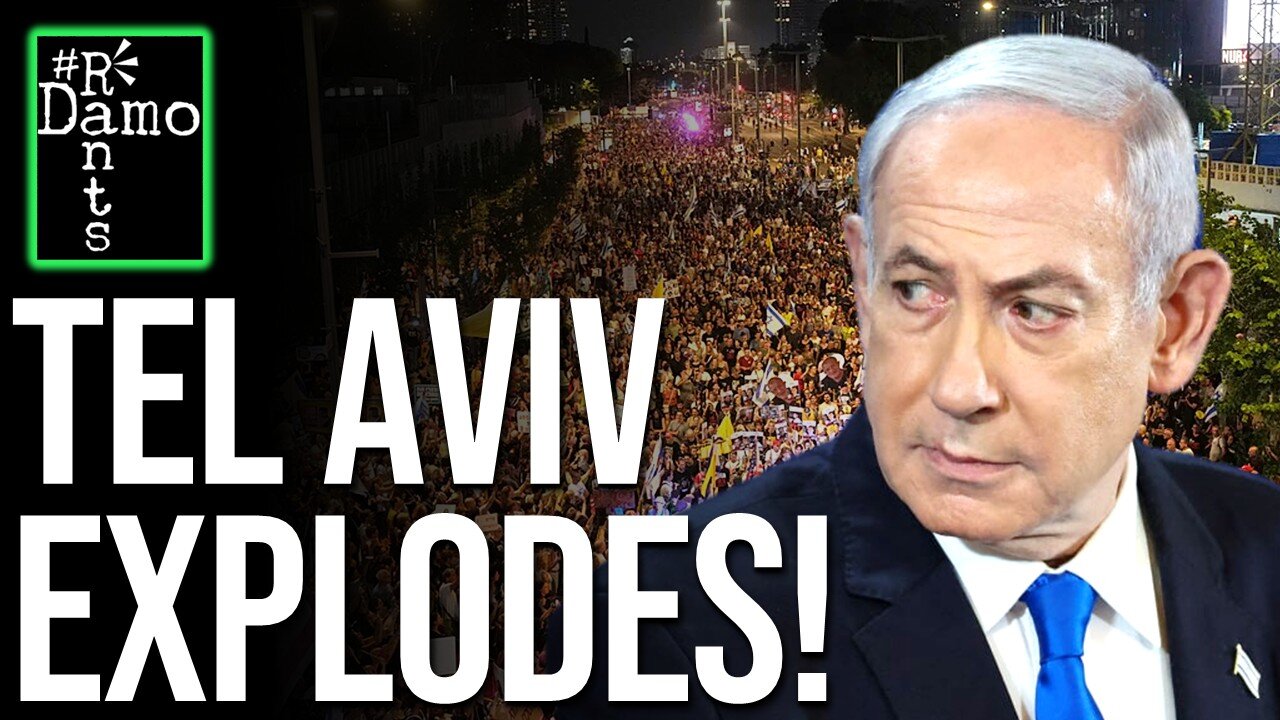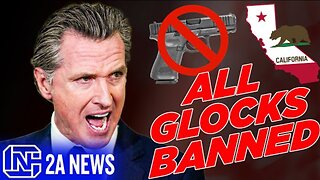Premium Only Content

Israel Turns Down Ceasefire — And Netanyahu’s Streets Explode in Fury
Right, so Israel has been handed what should have been a lifeline, what should have been the answer to want they said they wanted when they moved into Gaza under the auspices of rescuing their hostages, but which of course has been proven to have been an excuse and a lie; therefore instead of grasping this option put before them with both hands, they have instead chosen to wrap it around Gaza’s throat. While Hamas accepted a ceasefire proposal brokered by Egypt and Qatar, offering a sixty-day pause, prisoner exchanges, and the staged return of hostages, Benjamin Netanyahu responded not with diplomacy but with artillery. On the very night that Tel Aviv’s Hostages Square heaved with half a million citizens demanding peace, tanks rolled into Gaza City’s Sabra district and families were buried alive beneath the rubble. Not so much forced displacement but an acceleration now of the genocide that has already horrified us all for the last 22 months.
What should have been a moment of relief and restraint became instead a declaration that peace itself is now the enemy. Netanyahu dismissed the demonstrators as traitors, spurned the mediators who had delivered a rare chance for de-escalation, and pressed ahead with what Israeli and international human rights groups alike all now call genocide. This is avoidable, deliberate Israeli policy. It is the strategy of a regime that would rather burn than bend, prepared to sacrifice its own captives, who were never a priority and remain ever thus so. its credibility, and ultimately its claim to legitimacy in a single blaze of destruction that heralds so much worse to come. But will the world ever act to stop them, because this is not the behaviour of a state that believes it will.
Right so Israel has given up any semblance of reason that anyone frankly ought to be capable of defending. On one hand, millions of its own citizens took to the streets in the largest anti-government demonstrations in the country’s history, demanding an end to the war in Gaza and a ceasefire agreement that might bring home the remaining hostages. The protests that filled Tel Aviv’s Hostages Square with more than half a million people, and spread nationwide to over a million, were not marginal events but the roar of a society rejecting its own government’s chosen path. “Not in our name,” read placards and banners, as families of hostages stood shoulder to shoulder with students, workers, and retired military officers calling for diplomacy over further bloodshed. Instead the bloodshed suddenly escalated.
At the same moment, Israel’s leaders ordered tanks and artillery into Gaza City, the start of the ground invasion, a place that is home to nearly half of the Strip’s entire population. The neighbourhoods of Sabra and Zeitoun, already battered by months of siege, became the sites of fresh massacres as shells ripped through apartment blocks and reports emerged of entire families being obliterated in their homes. Journalists on the ground reported the killing of their colleagues. Humanitarian monitors described dozens of casualties in a single day, with international wire services tallying eighty-nine deaths in a twenty-four-hour span.
The contrast could not be sharper. On the same day that Hamas announced it had accepted a ceasefire and hostage release proposal brokered by Egypt and Qatar, Israel accelerated its ground invasion, paying no heed to it. Rather than embrace the chance to save lives, free captives, and ease international pressure, Benjamin Netanyahu dismissed the demonstrators as weakening Israel and declared that the war must go on and of course it must, its keeping him out of jail and in power and that is what it really all comes down to. Gaza must be razed and conquered and seized for his career.
The truce plan crafted by Egypt and Qatar represented one of the clearest opportunities for peace in the entire war. It was not an amorphous appeal to “calm” but a detailed framework: a sixty-day cessation of hostilities during which Hamas would release hostages in phases, Israel would reciprocate with hostage releases of their own, I dislike referring to them as prisoners because so many of course are held on either trumped up charges or none at all, and humanitarian aid would flow into Gaza. Negotiations for a more durable arrangement would take place in parallel.
Hamas accepted the proposal, with Palestinian outlets describing it as a chance to “open the door to de-escalation and dignity.” The peace option does have to keep being attempted. The significance of this acceptance cannot be overstated either. It reflected not only the pressure of international mediators but also Hamas’s willingness to secure breathing space for Gaza’s population. Egypt and Qatar invested their diplomatic capital in the proposal, making its adoption a test of whether Israel could be compelled to compromise.
For the families of Israeli hostages, the deal represented hope where before there had been despair. Every day of bombardment heightened the risk that their relatives would die in captivity either of the starvation Israel is inflicting on the Strip or under Israel’s own bombs. A truce tied to staged releases was the most realistic mechanism for securing their return. For Palestinians, the promise of relief from relentless shelling and access to aid meant the difference between survival and famine. For Israel itself, the truce offered the chance to pause without admitting defeat, an opportunity to recalibrate and re-engage with the world on better terms.
Yet the Israeli government not only refused the offer but intensified its assault. The official line, repeated by Netanyahu and the war cabinet, was that only complete victory could guarantee security and that any pause would allow Hamas to regroup. In truth, the rejection stemmed from political calculus, coalition dynamics, and an ideological unwillingness to treat Palestinians as negotiating partners. Politics, power and racism are driving Netanyahu’s government in its decision making.
On a personal level, Netanyahu faces a corruption trial that threatens his career and legacy. Prolonging the war has repeatedly served as a shield against accountability, allowing him to delay legal proceedings and present himself as indispensable in a moment of national crisis. The timing of escalations has often aligned with key court dates or coalition rifts, I’m sure its all coincidence not, very much suggesting that war is not only a policy but also a tool for his own personal survival.
Politically, Netanyahu’s coalition is dominated by figures such as Bezalel Smotrich and Itamar Ben-Gvir of course, each of whom is capable now of bringing down this minority administration of Netanyahu’s, who openly call for the eradication of Palestinian life in Gaza. For them, a ceasefire is not merely undesirable but intolerable, as it would legitimise the continued existence of Palestinians on their own land, land their settler base has designs on. Netanyahu, dependent on their support, cannot risk a pause without endangering his government.
Ideologically, Israel’s doctrine remains rooted in the conviction that security is achieved through overwhelming force rather than compromise. A truce that requires negotiation with Hamas would implicitly recognise the group as a political actor and acknowledge Palestinian agency, never mind the fact it is Palestinian land, never mind Hamas are the elected administration, more than just militant resistance. For a government that equates recognition with defeat, this is unacceptable though.
Thus, the decision to reject the ceasefire as they have rejected so many before, though this time without even engaging with it and expand the Gaza City offensive was not the result of a sober assessment of military necessity. It was a political choice shaped by the imperatives of Netanyahu’s personal survival, the preservation of his coalition government, and ideological hatred. In this sense, genocide is not an unintended consequence of war but the driver of it.
Gaza City, home to nearly half of Gaza’s 2.1 million people, has become the epicentre of Israel’s genocidal campaign now. The government initially framed its assault as an operation to “relocate” civilians southward, get them sent to a third country, South Sudan being tapped up for that role, though they deny it. Yet of course under international law, forcible transfer of civilians from occupied territory is explicitly prohibited under Article 49 of the Fourth Geneva Convention. Even if carried out without bloodshed, it would constitute a war crime, but Israel have done it before already and are doing so again now it seems. Well not quite.
In practice, this time around there has been no relocation corridor. Instead, there has been indiscriminate bombardment. The neighbourhoods of Sabra and Zeitoun have endured relentless shelling, with eyewitnesses reporting tanks firing into residential buildings and artillery strikes collapsing entire blocks.
Local outlets reported the killing of journalists in Sabra, alongside families who had refused or been unable to flee. Eyewitnesses described bodies lining the streets and entire families erased in moments. Aid workers prevented from getting in to help. These are not accidents or excesses but the direct result of a policy that sees Gaza City not as a community of civilians but as a target to be made uninhabitable.
The combination of starvation—engineered through blockade and deliberate obstruction of aid—displacement, and massacre fits the definition of genocide under the 1948 Genocide Convention. Genocide is not only about killing but about acts intended to destroy, in whole or in part, a national, ethnic, racial, or religious group. Israeli human rights organizations including B’Tselem and Physicians for Human Rights–Israel have described the campaign in precisely these terms, and if Israeli groups can say it, none of us have any excuse not to.
While Gaza burned, Israel itself convulsed in protest. On August 17, more than a million people joined nationwide demonstrations, with five hundred thousand converging in Tel Aviv alone. The sheer scale of the protests dwarfed anything in Israel’s history, including the mass rallies over judicial reform back in 2023. Families of hostages led the march, their grief sharpening into fury at a government that seemed willing to sacrifice their loved ones rather than pursue a truce, but then if the hostages were all rescued Netanyahu’s excuse to continue would evaporate wouldn’t it? He needs these people where they are to carry on his genocide to keep himself in power. Civil society organizations, university presidents, and ordinary citizens all added their voices, demanding that Netanyahu stop the war and strike a deal.
They argued that the war endangered Israel itself by isolating the country diplomatically, weakening its security, and prolonging the agony of the hostages. Placards read, “Ceasefire saves lives,” and “Bring them home now.” The slogan “Not in our name” captured the disavowal of Netanyahu’s path, a refusal to be complicit in the annihilation of Gaza. Netanyahu’s backers even called these marches Hamas support riots, so now even Israelis are getting called Hamas it seems by this insane administration and their hangers on.
Netanyahu’s response was one of contempt. He condemned the protesters as weakening Israel and hardening Hamas’s position. His government would not therefore heed its citizens any more than it would heed international mediators. In doing so, Netanyahu revealed that his primary concern was not national security or public opinion but the maintenance of his own power. This underlying point is now undeniable.
The protests mark a rupture in Israeli political life though. They signify not only opposition to a particular policy but a crisis of legitimacy. A state that ignores the pleas of its citizens and sacrifices their relatives has forfeited its moral claim to rule.
The rejection of the ceasefire and escalation of genocide have produced fallout across multiple dimensions.
Diplomatically, Israel has humiliated its mediators. Egypt and Qatar, who invested in crafting the truce, now face the embarrassment of having brokered a deal that was dead on arrival. Note to selves: you can’t negotiate with a man like Netanyahu for whom the war itself is keeping him in post. You cannot negotiate with such a man and more fool you for having business dealings with such a man as well as Egypt very much is to the tune of tens of billions right now. The shame goes double for Sisi. Even the United States, long Israel’s most loyal patron, has found itself strained, defending a partner whose actions increasingly resemble the crimes Washington once condemned elsewhere, but I very much doubt the Trump administration will ever shift. European states, including Spain, Norway, and Ireland, have moved toward recognition of Palestine and support for sanctions. If this pattern accelerates, Israel could soon find itself with only a handful of unconditional allies left, a position that would have been unthinkable even a few years ago and if they don’t end up recognising Palestine in light of all this, it will be toxic to their own careers as the general public across the world overwhelmingly condemns what is now obvious to us all. Israel is a genocidal apartheid state and we condemn them utterly for it.
Legally, the International Court of Justice is hearing South Africa’s genocide case against Israel, and actions like these mean it gains new evidence seemingly with every passing day. The International Criminal Court has already issued arrest warrants for Netanyahu and others, and the assault on Gaza City strengthens the case that genocide is not incidental but intentional. Whether these courts succeed in holding Israeli leaders accountable or not, the proceedings already erode Israel’s global legitimacy and chip away at Western claims to uphold international law, especially as those with arrest warrants like Netanyahu, still manage to travel freely around the world.
Strategically, Israel is more vulnerable than it has been in decades. The Houthis in Yemen persist in targeting Israel-linked shipping in the Red Sea, driving up insurance costs and disrupting trade. Far from isolating Hamas, it has failed utterly to eliminate them, their actions serving more as a recruitment drive. Israel has embroiled itself in a regional confrontation it cannot control. Instead of deterrence, its actions have invited a widening conflict that could outstrip its military and political capacity to manage, a warning Netanyahu’s Chief of Staff Eyal Zamir has made clear, recruitment is dire right now and yet still they get ordered into Gaza City.
And beyond Israel itself, there are broader global stakes. By defending and arming Israel in the face of mounting evidence of genocide, the United States and Europe undermine their own credibility on human rights and international law. This opens the door for rivals like China, Russia, and Iran, all the nations we in the West are told to be fearful of and to despise to present themselves as alternative guardians of global norms, shifting the balance of international legitimacy away from the West. The consequences of Israel’s rejection of peace thus ripple far beyond Gaza or Tel Aviv, threatening to redraw the lines of global power and righteousness.
Netanyahu’s decision to steer Israel towards global pariah status and ruination lies in the convergence of his own self-interest, coalition dynamics, and ideology. War allows Netanyahu to delay his corruption trial, hold together his far-right allies, and cling to power. His coalition partners demand annihilation, not compromise, and he delivers accordingly, too weak functionally to do otherwise. Ideologically, Israel’s ruling class remains committed to domination as the path to security, rejecting any arrangement that acknowledges Palestinian agency.
Genocide, therefore, is not a tragic accident but the logical expression of this convergence, it is intentional, it is deliberate, it is beyond the point of debate, it is point of fact. The destruction of Gaza City, the starvation of its population and the rest of Gaza, the rejection of diplomacy, and the dismissal of protests in Israel itself are all consistent with a strategy that values power over peace, survival of the regime over survival of its own citizens, and annihilation of an enemy already living under decades of illegal occupation over coexistence.
The events of August 2025 reveal a state crossing the threshold from genocidal apartheid state to absolute global pariah. To be honest I think they’ve surpassed even that point too, but even a mouthpiece like can’t find words that fit at this point. Domestically, it faces unprecedented revolt and that doesn’t surprise me either, no matter how many polls imply Israeli support for genocidal action. Internationally, it is alienating allies and legitimising sanctions of which there still aren’t nearly enough. Legally, it is entangled in cases at the ICJ and ICC that I am certain will define the Israeli state in the history books as genocide enactors. Economically, it is losing investment and trade partners. Strategically, it is besieged by regional actors emboldened by its brutality. It’s propagandised victim status has crashed and burned as well, ever more so with every building in Gaza that gets flattened.
Most profoundly, it has lost all its moral legitimacy. By rejecting peace and escalating genocide, Israel has shown itself to be a regime that listens neither to its victims nor to its own people. It has chosen annihilation as national policy, and in doing so, it has set itself on a path toward isolation, disgrace, and eventual collapse. Israel had a legitimacy problem given how it was founded to begin with, there’s little prospect of fighting back on that argument after this.
August 2025 will be remembered as the moment when Israel was offered peace and deliberately chose genocide instead of engaging with that opportunity. A ceasefire was on the table, hostages could have come home, and aid could have flowed. Millions of Israelis demanded this path. Netanyahu’s government rejected it, intensified the assault on Gaza City as they did so, and presided over massacres in Sabra and Zeitoun.
The fallout is already becoming visible: diplomatic humiliation, legal jeopardy, economic divestment, strategic vulnerability, and domestic revolt. But these outcomes are not static—they are cascading processes still unfolding and will continue to for as long as Israel continues what it has now begun with the world still unprepared to stop them. Whether Israel can withstand the domestic backlash, the tightening legal noose, the erosion of its economy, and the rising tide of international condemnation remains uncertain, but what is certain is that without an opposing humanitarian military intervention now, they will carry on, Sabra and Zeitoun are just the start if nobody stops this.
A government that sought security through domination has instead made Israel more insecure than at any point in its history. In seeking to annihilate Gaza, raze it to the ground and eliminate its people as I fear we’re now seeing the beginning of, it has destabilised its own society, endangered its own citizens, and accelerated its slide towards that absolute pariah status. The very tools of survival Netanyahu clings to for his own ends, may yet prove to be the instruments of his undoing.
The choice was clear: peace was just made possible again, but genocide was deliberately chosen instead. That’s on Netanyahu and Israel and they must be held to account for it.
Sadly, even now, there are those who would do business with Israel. I mentioned Egypt as a peace broker here, yet they have signed a $35B gas deal with Israel and refuse to aid Gaza by opening their door to aid via Rafah, for fear of losing US support and funding. Turkey likewise delivers 40% of Israel’s oil, and I covered both of these contradictions in a video yesterday, but worse than that is the news of a $1.63B deal for, of all things, Israeli arms as the commit genocide and yet this is what the deeply unpopular government of Serbia has just done, eliciting much protest by their people and potentially destabilising the Balkans all over again, the risk of this action potentially leading to a new arms race there and again, Israel is at the heart of it. Get all the details of that story in this video recommendation here as your suggested next watch.
Please do also hit like, share and subscribe if you haven’t done so already so as to ensure you don’t miss out on all new daily content as well as spreading the word and helping to support the channel at the same time which is very much appreciated, holding power to account for ordinary working class people and I will hopefully catch you on the next vid. Cheers folks.
-
 2:30:00
2:30:00
Badlands Media
11 hours agoDevolution Power Hour Ep. 392
69.8K6 -
 3:02:08
3:02:08
TimcastIRL
5 hours agoLeftist Terror Attack On ICE In Dallas, Jimmy Kimmel Doubles Down Insulting MAGA | Timcast IRL
329K134 -
 1:17:35
1:17:35
Man in America
10 hours agoIs Starlink RIPPING Us Apart from the Inside Out? w/ Cory Hillis
32.3K13 -
 55:40
55:40
TheSaltyCracker
4 hours agoIdiots Chug Tylenol PT2 ReeEEStream 9-24-25
80.1K206 -
 LIVE
LIVE
Akademiks
5 hours agoYoung Thug Dissing YFN Lucci. Ready to Go back to Jail. Offset vs Cardi b
1,138 watching -
 7:07
7:07
Colion Noir
13 hours agoCalifornia Just Banned All Glocks
38.4K34 -

Adam Does Movies
6 hours ago $0.90 earnedTalking Movies + Ask Me Anything - LIVE
29.6K1 -
 1:23:56
1:23:56
Jamie Kennedy
4 hours agoChoosing Good in a World Gone Dark | Ep 223 HTBITY with Jamie Kennedy
27.3K6 -
 DVR
DVR
SpartakusLIVE
8 hours ago#1 Challenge CHAMPION of WZ || Ridin' The GRAVY Train w/ GloryJean
68.5K1 -

The Pascal Show
3 hours ago $1.09 earnedDISTURBING UPDATES! New Developments In The D4vd Celeste Case... Possible Celeste Sighting?!
25.8K2